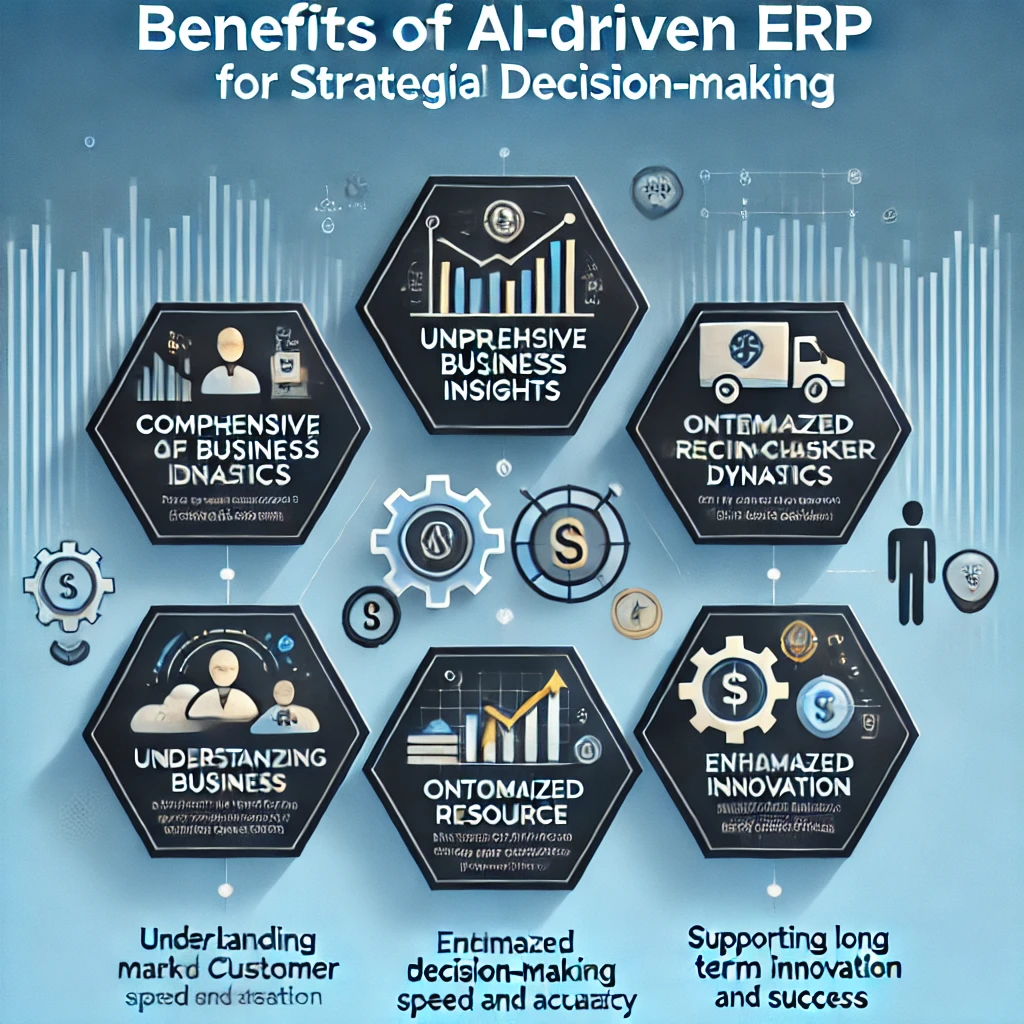The Transformational Impact of AI on ERP Systems
For companies struggling with cumbersome, outdated systems and endless data entry, there’s hope on the horizon. According to recent research, over 60% of companies are looking to incorporate artificial intelligence (AI) into their enterprise resource planning (ERP) systems to enhance efficiency and productivity.
The integration of Artificial Intelligence (AI) into ERP systems has ushered in a new era filled with potential and innovation. Leading ERP providers worldwide are now deeply focused on embedding AI within ERP software to boost productivity and reduce costs. This rise in AI-driven ERP has the power to fundamentally transform the industry, reshaping how businesses interact with and extract value from their ERP systems.
Despite all these, the pressing question still remains- Can AI actually transform ERP into a more intelligent, insightful tool that helps your business remain competitive? If you are curious about the same, keep reading to understand how organizations should prepare for the next wave of AI, and ERP procurement.
ERP has revolutionized countless businesses, and now, AI is poised to transform ERP itself in this new era.
The Rise of AI-Enabled ERP In Modern Day Businesses

An ERP system acts as the heart of a business, connecting all areas from finance and supply chain to customer service and human resources. Traditional ERP systems provided valuable support, to centralize data and smoothen workflows across various departments. However, they often require significant manual input and lack the ability to derive actionable insights from large datasets.
In this scenario, AI-enabled ERP solutions were introduced to present the monumental shift in how companies approach their internal processes. This process combines traditional ERP functionality with advanced AI technologies, like machine learning, natural language processing, and computer vision. Ultimately, helping technologies give ERP systems the capability to learn and adapt, facilitating them go beyond simple data processing.
Through this modern-day businesses can now predict trends, automate repetitive tasks, and adapt to new information in real time. Industries such as manufacturing, retail, and logistics are already pioneering the use of AI-driven ERP to optimize supply chains, improve demand forecasting, and enhance customer service.
Want to Explore the Impact of AI on ERP Software?
Enhanced Automation and Efficiency through AI in ERP Systems
With ERP automation powered by AI, companies can reduce human error and improve consistency. For example, an AI-driven ERP solution can capture, classify, and enter invoice data with near-perfect accuracy, freeing up employee time to focus on strategic initiatives. Check the other impacts below.
1. Refocusing on Data Value
The introduction of AI in ERP systems is enabling businesses to re-evaluate the role of data. The performance of AI models heavily depends on the quality, accuracy, and completeness of data within ERP systems. This has led organizations to improve their internal data management practices and consider external data sources, such as weather data, to make more accurate predictions and achieve better outcomes.
2. Increasing Employee Engagement
Incorporating AI within ERP’s Human Resource Management System (HRMS) module can significantly improve employee engagement levels. Low engagement often results in lower productivity and higher turnover. Through AI-driven tools like virtual coaches, chatbots, and goal-setting platforms, organizations can provide real-time feedback, identify individual strengths, and keep employees updated on their progress. This AI-driven approach in HR processes boosts engagement, automated workflows, and provides insights into employee preferences, fostering a more motivated workforce.
3. Driving Strategic Thinking with AI
Combining ERP automation with AI helps organizations adopt a more strategic approach toward technology. Instead of viewing ERP as merely a back-office tool, AI integration enables ERP systems to become a driving force for achieving long-term objectives. Thus, by analyzing transactional data, AI allows companies to spend less time on manual work and more on decision-making that aligns with their broader strategic vision.
4. Reshaping Customer Relationship Management (CRM)
AI is transforming Customer Relationship Management (CRM) by introducing advanced features that were not possible before. With AI integration, CRM modules within ERP can now automate tasks like sending follow-up emails, analyzing account data, and predicting lead conversions. These capabilities improve process automation, personalize customer interactions, and allow CRM systems to move from merely operational functions to value-adding assets.
5. Redefining the Role of ERP Systems
Traditionally, ERP systems were seen as expensive, complex projects with limited returns. However, with AI integration, the purpose of ERP systems is being redefined. AI transforms ERP software into a more valuable asset by enhancing an organization’s efficiency, effectiveness, and alignment with strategic goals. This shift demonstrates how AI-driven ERP solutions can contribute to overall business success.
Expert Opinion
Quality data is essential for effective AI in ERP. As IBM’s George Fuechsel once said, “Garbage in, garbage out.” This highlights that accurate, relevant data is crucial for reliable business intelligence. AI can prepare, check, and integrate data, helping ERP systems reveal valuable insights without manual analysis.
Predictive Analytics and Data-Driven Decision Making
One of the standout advantages of AI in ERP systems is its ability to provide predictive analytics. These AI-powered analytics enable organizations to make proactive rather than reactive decisions, helping them stay ahead of market trends and prepare for demand shifts.
1. Demand Forecasting for Proactive Procurement
Predictive analytics in ERP allows businesses to forecast demand in advance, enabling the procurement team to order materials early. This ensures that production is prepared to meet customer needs without delays, reducing stockouts and maximizing customer satisfaction.
2. Optimized Inventory Management
With predictive insights, ERP systems can manage inventory more effectively, minimizing overstock and avoiding stock shortages. Hence, patterns are analyzed by the system to ensure optimal stock levels and balance cost efficiency to meet the ongoing demand.
3. Maintenance Scheduling to Reduce Downtime
Predictive analytics enables logistics and manufacturing companies to schedule maintenance proactively, preventing unexpected equipment breakdowns. This reduces downtime, enhances operational efficiency, and improves overall reliability in service delivery.
4. Enhanced Planning with Advanced AI Technologies
Leading ERP systems now integrate technologies like machine learning, virtual assistants, and generative AI to analyze vast amounts of data. This helps organizations to achieve actionable insights related to complex business processes and forecasting capabilities.
5. Improved Customer Behavior Analysis
AI-driven ERP systems enhance market research and customer behavior analysis by identifying trends quickly and accurately. This helps businesses anticipate customer needs, plan inventory, and allocate resources effectively to meet future demand.
Reports from Industry Leading Organizations
Oracle, a prominent ERP solutions provider, now offers versatile AI solutions, serving industries such as finance, human resources, marketing, and manufacturing. Their offerings span natural language processing, computer vision, speech recognition, conversational AI, anomaly detection, and predictive analytics.
Intelligent Process Optimization with Machine Learning Integration
Machine learning ERP integration enhances process optimization by enabling systems to continuously learn and adapt in real-time. It analyzes large data sets to identify patterns and make adjustments in areas like supply chain and finance, optimizing efficiency and reducing risks. Here’s how.
1. Continuous Learning and Improvement
Machine learning ERP integration improves process optimization by enabling systems to learn and improve over time. As new data flows in, the ERP can analyze it, identify patterns, and make adjustments to enhance efficiency across various operations.
2. Real-Time Supply Chain Adjustments
In supply chain management, machine learning can monitor factors like supplier performance, lead times, and cost changes. Based on these insights, the ERP can dynamically adjust procurement strategies, leading to better cost management and more efficient operations.
3. Enhanced Financial Monitoring
Financial departments benefit from machine learning ERP integration by detecting anomalies in transaction data. This real-time analysis helps identify potential fraud risks and irregularities, ensuring a more secure and reliable financial process.
4. Improved Financial Planning
Machine learning supports financial planning by analyzing historical data to forecast future trends. This predictive capability allows finance teams to make more accurate budgeting decisions and improve resource allocation.
5. Driving Operational Excellence
By making continuous, data-driven adjustments, machine learning helps ERP systems achieve a higher level of operational excellence. These real-time improvements enhance customer satisfaction, streamline processes, and contribute to the overall growth and agility of the business.
Curious how AI can transform your business with an AI-powered ERP system?
Benefits of AI-Driven ERP for Strategic Decision-Making

Executives and decision-makers gain immense value from the insights offered by AI-driven ERP systems, which provide a comprehensive view of business metrics. This enables them to understand market dynamics, customer behavior, and internal performance, supporting strategic planning and fostering sustainable growth.
1. Comprehensive Business Insights
AI-driven ERP systems provide executives with a detailed view of key business metrics, enabling leaders to make informed strategic decisions and improve competitive positioning.
2. Understanding Market and Customer Dynamics
By analyzing data on market trends and customer behavior, AI-driven ERP empowers organizations to anticipate changes, adapt strategies, and drive sustainable growth.
3. Optimized Resource Allocation
AI insights allow executives to forecast sales trends and focus resources on the most profitable products or services, ensuring better alignment with market demands.
4. Enhanced Decision-Making Speed and Accuracy
According to McKinsey, companies using AI for strategic planning benefit from faster decision cycles and more accurate data, which are critical for staying competitive today.
5. Supporting Long-Term Innovation and Success
As AI technology advances, organizations with intelligent ERP systems are better positioned to leverage data for innovation, helping them achieve long-term success and maintain a market edge.
Conclusion
The advantages of AI-driven ERP systems are clear, including improved automation, predictive insights, process optimization, and strategic decision-making capabilities. For companies looking to future-proof their operations, integrating AI into their ERP systems can provide a significant competitive advantage. AI-enabled ERP solutions enable businesses to operate more efficiently, respond proactively to market changes, and support long-term growth.
As you consider the digital transformation journey for your own organization, it’s crucial to assess whether your current ERP system is equipped for AI integration. Working with a provider like Datafy Inc., which specializes in advanced data solutions, can help ensure your ERP system is ready for the future of AI-driven business management. Utilizing this transformation can set your business on the path to increased efficiency, reduced costs, and sustainable growth.
If you’d like to brainstorm ideas around AI, digital transformation, or ERP software, feel free to reach out here. Our team would be glad to have a conversation with you to share insights and brainstorm points together.

